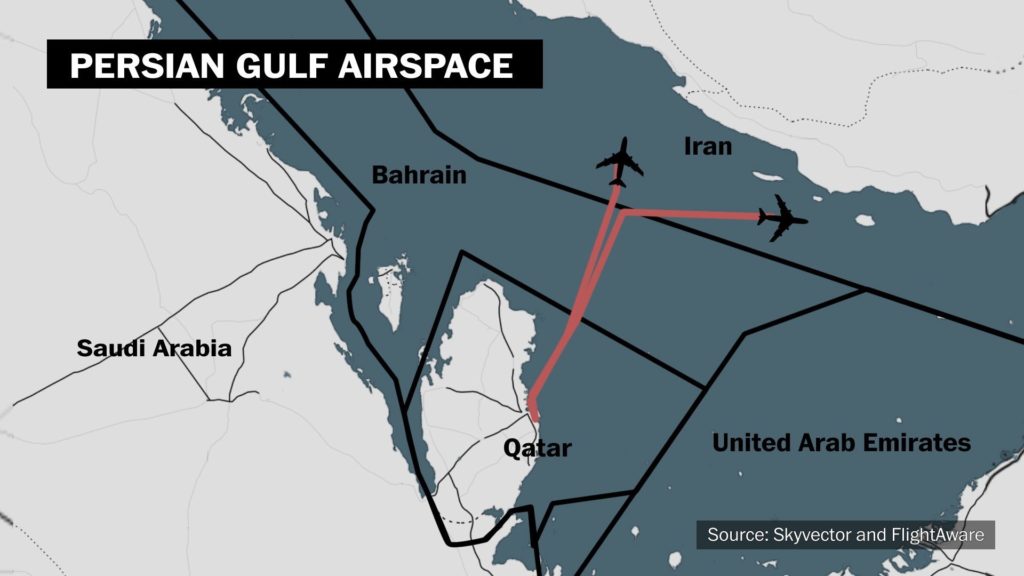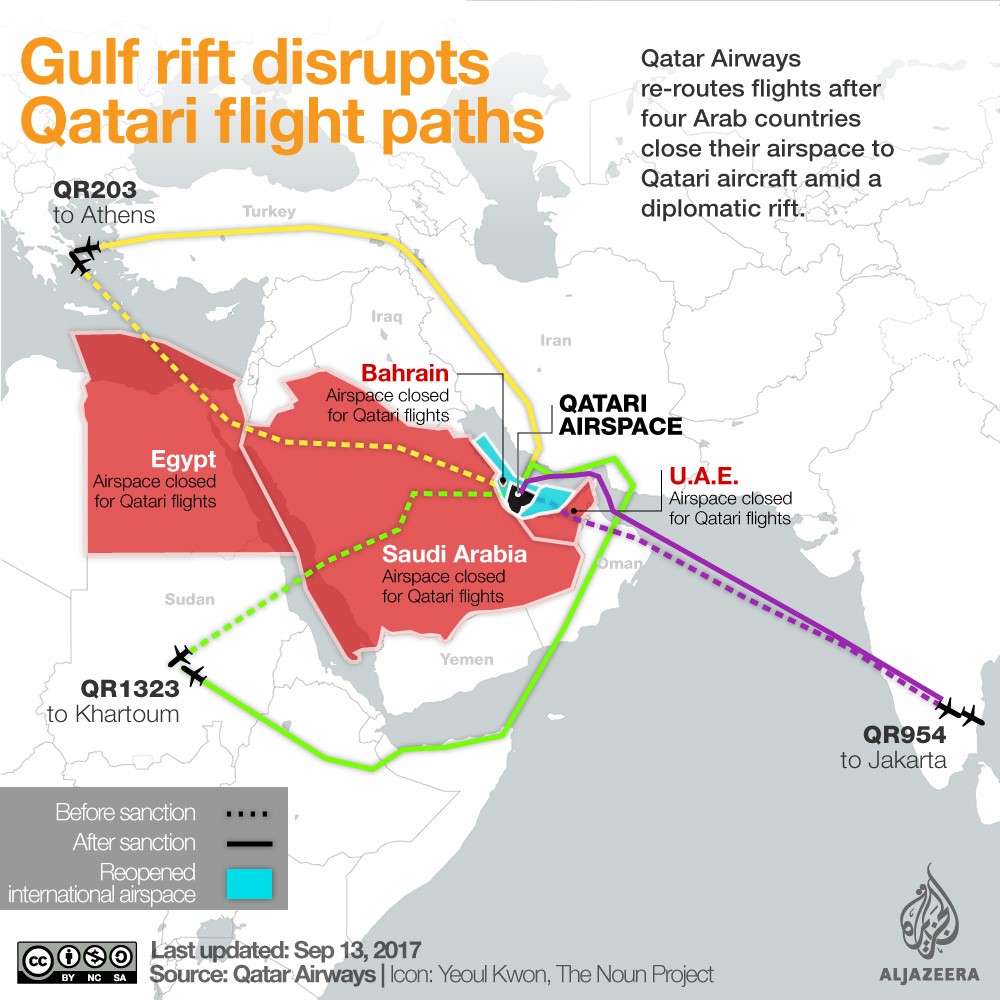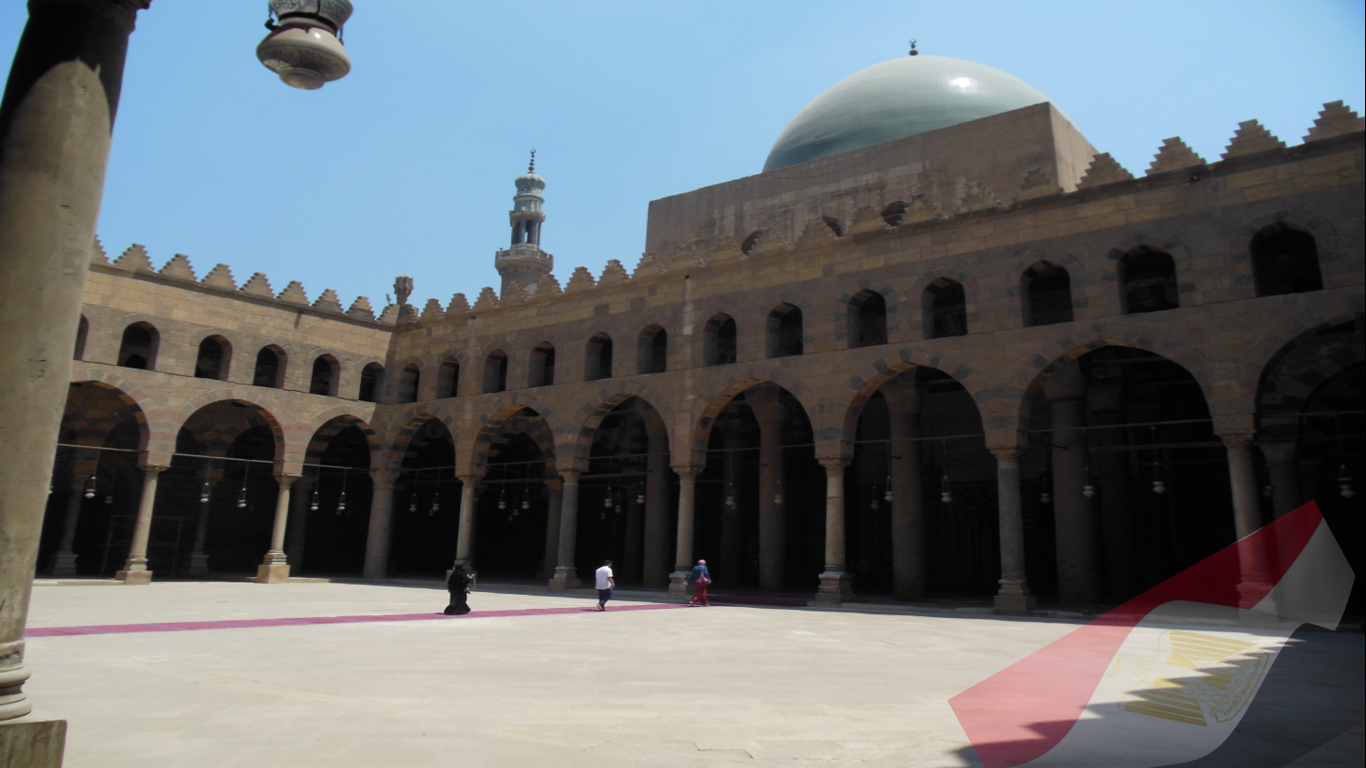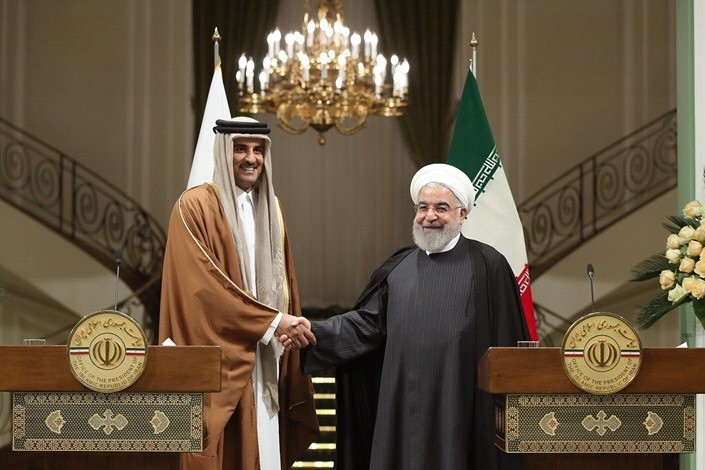On 12 January 2020, amidst the biggest crisis in the Gulf since the American invasion of Iraq, Tamīm ibn Ḥamad Qatari emir visited Iran, and was welcomed with stringing splendor. The visit comes at the time, when the regional tension is still extremely hot and the balance between Washington and Tehran swings back and forth. The American assassination against the most celebrated Iranian general Qāsem Soleymānī caused outrage and Iran showed power by hitting back to the biggest American base in Iraq – and one of the biggest in the region -, ‘Ayn al-Asad, and promised even more resolute measures. But all the favors and sentiments gained, which noticeably horrified many regional opponents of Iran, like Saudi Arabia reaching out for mediation and de-escalation, evaporated by the incident of shooting down an Ukrainian airliner above Tehran. This not only caused regional outrage, this time against Iran, but caused once again uproar within Iran against the government.
This backlash, however, seemed to effect the Iranian regional standing little. A number of high level delegations visited Tehran since the death of Soleymānī, from Ḥamās leader Haniyya to the Pakistani Foreign Minister, and even Erdoğan expressed his deepest condolences, all showing a level of support, and in many ways the most significant among them was the Qatari delegation, lead by the Qatari Foreign Minister. That signaled that in this moment, when for many Iran seemed possibly dangerous and erratic, but also vulnerable, members of the GCC don’t try to exploit this occasion, but rather reach out to Tehran. Doha might had its own selfish reasons for that, trying to maintain good relations with Iran, and by this gaining a favor with the party that guarantees the lifeline of support from Turkey, while its own fellow Arab neighbors – or at least some of them – are sieging it. Yet, if some thought that was only a tactical courtesy visit had to see that Doha once again things way much more ahead. Because this time the immediate visit by the Foreign Minister was repeated by the Emir himself, and at a time, when Iran was already sinking in the Ukrainian plane crash scandal.
The visit understandably left many to wonder, whether Qatar is once again outsmarting all by advancing its own interests, conducting a mediation by the US, or by easing the tension trying to gain favor in Riyadh and stimulate the already initiated rapprochement with Saudi by doing what the kingdom cannot, engaging in direct talks with Iran for consolidation.
Qatar and Oman – if indeed that latter is about to do that – are, however, not the only parties, which feverishly try to engage with Iran now. So far the Iranian response to the Americans was seemingly mild, even backlashed by shooting down the Ukrainian plane, but the regional responses indicate something different. The Saudi and Emirati nervousness added to the equation, it seems something significant is brewing. What are these possibilities and where does this Qatari visit fit into this supposition?
The visit by Tamīm
On 13 January Emir Tamīm visited Tehran, only after little more than a week his Foreign Minister was the first one the first Arab official to go to Iran and express condolences for the death of General Soleymānī. Tamīm was met with obvious splendor, which is well understandable from Iran trying to show that it has support from the Arab world.
The joint press conference by Emir Tamīm and President Rōḥānī, though carefully avoided any specifics about the reasons of this visit, or any accords signed by the sides, stressed cordial and almost brotherly relations between the two sides. And surely the ties will only go stronger with the announcement of joint committees to be formed.
The reactions were noticeably mixed in the Gulf, even by the Saudi sides. Two years ago after a similar visit it was not surprising to see that certain channels, like the Saudi state channel al-Arabiyya to air analysts in live broadcast, who not only called Qatar a traitor and an enemy of its Gulf neighbors, but also as an Iranian instrument. Practically a state occupied by Iran, which with Turkey work against the Arab world. Of course, in this discourse the term “Arab world” equals the the policies of Saudi Arabia. Now it was more surprising to see that in many international channels’ Arab language discussion programs from RT to France 24 even Saudi commentators took a much more moderate approach. Most of these opinions only stressed that if Qatar is on a diplomatic path to ease the tension between Washington and Tehran for the benefit of the Arab states, or the Gulf, than Doha acts on its own and on no conditions can it represent nor the Arab world, nor even the GCC. Which is an absolutely understandable position to take, since it would indeed be an embarrassment for Saudi to allow Qatar to talk to Iran in its behalf, thought for years Riyadh accuses Qatar as a terror sponsoring country. Yet the obviously mild responses from the Saudi and Emirati states respectively might suggest that they are aware of mediation attempt by Qatar, either on behalf of the Americans, or for the sake of the Gulf states, which is now welcomed in Riyadh. The occasional vitriolic voices are only a smokescreen, since they rarely appear outside the channels, which are strictly for domestic or allied audiences.
The visit by Tamīm goes way beyond the formal courtesies between Qatar and Iran. It is interesting to see that during the visit Emir Tamīm refrained to touch any sensitive matters, like the Iranian strike on the American ‘Ayn al-Asad base in Iraq, the Iranians shooting down the Ukrainian airliner, or the heated remarks on the debriefing of Amīr ‘Alī Ḥağīzāde, the Pāsdārān’s Aerospace Force commander. After the strike on the American base Ḥağīzāde said the Arab states have to expel the American forces, or otherwise their people will rise up and will do that. He specifically mentioned all neighboring states except Saudi Arabia, including Qatar. Which was a most foolish message from such a high-ranking commander, but the fact that it caused no reactions by Qatar means that high politics are busy on both sides build good relations.
Reason?
Why did Emir Tamīm pay such a visit, and why is Qatar so silent on both the reasons and on the sometimes scandalous remarks by certain Iranian dignitaries? One possible answer is that Doha is simply fulfilling a diplomatic maneuver, mediating on Trumps behalf. If that is to be correct the most likely message is that Washington will not respond to the strike on its base, Iran could have had its response and that should be the end of it. No further escalation is in the interest of the Americans and the Iranians should refrain from further strikes. That might be unacceptable for Tehran, but there is not much it can do now.
The other possible answer is that Doha is acting on its own. If that is correct than the Qatari leadership views that the momentum in the region shifted – at least momentarily – to the favor of Turkey and Iran, their position is strong now, and wants to secure itself for the future. In such scenario the most plausible message is relatively similar to that of Pakistan, though more covertly that Qatar cannot expel the Americans, but it will not be part of any actions against Iran. In other words, if indeed a war is coming Qatar does not wish to be part of it. And at this notion it worths to point out that the message by Pakistan, that their land shall not be used by the Americans – or by the Saudis – against Iran and the state expressed condolences for the death of Soleymānī is also a very strong message. It shows that regardless the mistakes and the stemming isolation, Iran has significant support.
It is also possible that Doha senses the shift in Saudi Arabia, where the old guard tries to reiterate its control, which was clear in the recent reappearance of King Salmān and the sidelining of his heir. In such evaluation, most likely not by the direct request of Riyadh, Tamīm felt the time is right to mediate for the sake of the whole GCC not to be target of a possible Iranian retaliation, and in such a way can stimulate a peace process with Saudi Arabia. If the mediation goes well Doha can prove to the old guard in Riyadh that the Emirati attempts for escalation and their gamble that the US will crush Iran for their sake has failed, but the approach of Qatar for mild, but active dialogue can be fruitful. In such a way Qatar can hope to see the rift between Riyadh and Abū Zabī widen, consequently the relations with Saudi improve. The recent remarks by Tehran that is willing to directly negotiate with Saudi Arabia support this attempt by Qatar, but it should be remembered the Iran for long talks about this willingness. Given its lack of result it might just be yet another diplomatic maneuver.
The answer may also be a mixture of all these factors, and only time will tell, which suggestion was correct. Either way, the visit is significant. No matter how much it slipped the global attention. Emir Tamīm refused to go to the last GCC Summit in Riyadh, despite the personal invitation from King Salmān to him personally. Yet now, though he was not invited to a specific event and the tension is high in the region, he visited Iran, met with President Rōḥānī and even Supreme Leader Hāmeneī. He did that, knowing that all in the Gulf will compare the two gestures and will accuse him of being a traitor. And he did that despite three extremely important developments, which were all left untouched by Tamīm. Therefore the visit should not be underestimated in any ways.
The hit on ‘Ayn al-Asad
On the 8 January Iran hit the biggest American base in Iraq, the ‘Ayn al-Asad, which is the operations center for all Americans actions in Syria, and of most in Iraq. That we touched last week, but by now we see a little more clear about the results. The Americans so far talk about 11 wounded American soldiers, while the Iranians claim at least 80 Americans died in the strike. Either way on 11 January, so days after the incident, even CNN visited the spot and clearly proved that the base was hit very badly. CNN still claimed that no American soldiers died, which might indeed be inaccurate, since days passed by, but it reasoned the lack of major casualties by the previous intel the Americans got that they would soon be hit. That interestingly corresponds to some extent to the announcement of Major-General Ḥosseyn Salāmī, Commander of the Pāsdārān, who claimed that they were not aiming to kill in big numbers, but to break the will of the Americans.
Regardless the true extent of the strike, whether it killed Americans, or not; whether the Iranians directly or indirectly warned the Americans, or not; whether they did not want to shoot down any missile as they suggested, or they could as the Iranians claimed; and well beyond the extent, how much now the Iranian politicians want to magnify the matter, two facts are irrefutable. The Iranians did manage to hit ‘Ayn al-Asad precisely with several missiles and that caused terror within the American troops. The American explanations rise more questions than it answer. If indeed they knew about the hit why didn’t they did not shoot down the missiles instead of simply the soldiers taking shelters. How could they risk their soldiers being hit even in a shelter – such possibly is always given, regardless of all precautions -, or why did not they strike the Iranian launch sites? Why did they accept even the material loss on the base, which according to Trump costed billions, being the biggest reason why they don’t leave Iraq? Why did they allow to seem to be weak? Because after such a blunter it would be not surprising if the whole region rushed to buy Russian S-400 systems. This all rather suggest, though does not prove, that regardless all attempts the Americans could not evade the strike and it was highly effective. However, that does not explain why Washington is not letting the matter go, and does not cry for revenge.
Whatever is the explanation for that, either Trump does not want war now, or the military establishment opted for not pursuing the matter to a costly full war, the strike was indeed significant and in many ways historic. Surely now Tehran and its allies try to magnify the success, but it is true that now a state risked war and dared to conduct operation on an American military site. More so, it admitted it and took pride in it. It was not a rouge organization, or a terror group, but a state and a government. Such thing rarely even happened, and was unseen in the last three decades, which is a significant blow to the American standing.
It has a message to the Gulf, even more clear than the hit on Aramco, that if there would be a war, the Americans could not defend themselves completely, and after what they did with the Kurds in Syria no one should have any doubts how much will, or can they protect their allies.
Was the visit by Emir Tamīm insignificant?
The Ukrainian plane
Shooting down an airliner, especially at the very night Iran celebrated its retaliation on the Americans was a huge and unforgivable mistake. And that is through regardless the fact that the Americans are not as innocent in this as they are silent. Iran now takes the blame and accepts responsibility, but that does not mitigate the problem. But beyond the catastrophe that was a huge favor for all those, who attacked Iran for its missile program for years.
That tragedy suggest huge errors in the Iranian air control, or that there are significant coordination problems between the Pāsdārān air defense and the civilian air control. That is a matter for all in the region, not necessarily to those, who fly through Iran. Yet international condemnation is surprisingly little, mostly coming from those states, which are at odds with Tehran anyways, or those which lost citizens in the tragedy. Likewise Ukraine’s fury is justified.

But how come most Gulf states don’t press this matter to disarm Iran now, though they viewed the missile arsenal as a vital threat for years? And who else could be more concern about such a terrifying revelation, who’s practically sole lifeline comes through Iran? Which is Qatar. One does not even has to have a negative judgment on Iran to understand that all air traffic becomes effected by such a tragedy, and that probably effects the traffic of Qatar. Doha does not need to be on bad terms with Iran to rage out on the matter. The same Doha, which with Qatar Airways tries to be the transport hub of the region, which is rests upon Iran at well in the current situation. Yet, not a word from Tamīm.
Was the visit by Emir Tamīm insignificant?

The protests
Soon after the Iranian government admitted its role in the tragedy of the Ukrainian airliner, protests broke out once again, mostly in Tehran. Some of these directly called the Islamic Republic, the very state system to be dismantled.
These, however, especially after the Soleymānī’s funeral processions attended by millions even in Ahvāz, the city home to tension and the biggest Arab community in Iran, should not be overestimated. It is not such an uncommon thing to happen and the rage after the government lied for days about the tragedy is understandable, but the Iranian state still has huge inner support.
The same way the catastrophe backfired on the Iranian leadership, especially its lies, the attempts to use the protests for political reasons backfired even more, once again shifting sentiment in favor of the state.
When the first protests broke out on 11 January British ambassador Robert Macaire was present at one in Tehran, and was later arrested by the authorities and held for hours. That is a huge diplomatic scandal on its own, but few days later he was specifically expelled from Iran for charges of instigating unrest. The British press and the Foreign Office went far with the matter even claiming his life was danger. Soon enough, however, another version came out that though Macaire was present in a protest to witness it, when in turned violent he tried to leave and authorities arrested him for clearly being a foreigner. He was detained, but only for an hour, which was his original claim, and he was released soon after his identity was cleared. Such incident is not uncommon in chaotic circumstances.
Either way is correct it is clear that the British ambassador was present in an anti-government riot, about which the Iranian public will not learn too much, after which the Foreign Office provenly exaggerated the arrest of the ambassador and tried to exploit the plane’s tragedy to the maximum. In Iran if there is a country viewed more negatively and more conspiring than the US that is the UK. Meaning that the Iranian government now has a golden opportunity to defuse the protests as yet another British plot, against whom the Iranian public is notoriously paranoid. That might not be enough in Tehran, but will be a brilliant tool in all other places, and discredit the protests to a great extent.
Along with the airliner tragedy the protests undeniably shook the Iranian government’s standing, especially in the international forums. The slogans against the system itself is alarming, which would otherwise work as a golden tool in the Gulf to point out that their struggle is not against the Iranian people – of course it is -, but against a system its own nation hates. Yet only days after the protests broke out, and when they were still not satisfyingly contained Emir Tamīm showed support to the Islamic Republic and did not even hint the protests.
Was the visit by Emir Tamīm insignificant?


